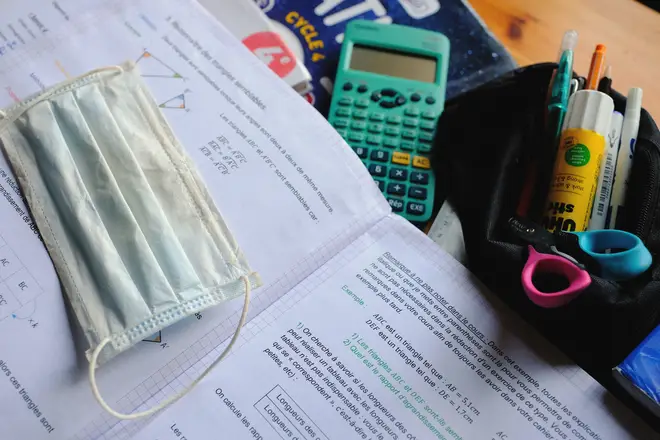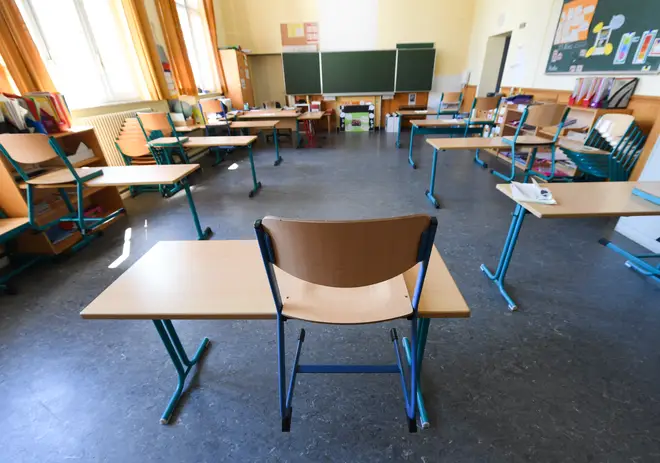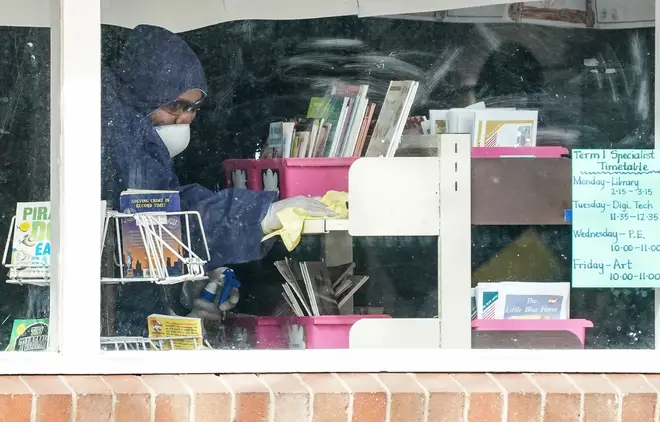
Clive Bull 1am - 4am
3 May 2020, 13:56

Primary schools in England could reopen as soon as 1 June under Boris Johnson's plan to ease the UK out of lockdown.
Boris Johnson is expected to lay out "phase two" of the UK plan to tackle the virus now the "peak of infections has passed" by the end of next week.
This plan is expected to lay out the "phased" reopening of schools, which have been shut since March 20 except for children of key workers.
In an unprecedented move, GCSE and A-level exams will also not take place and will instead be awarded in July based on mock exam results.
As part of the plans to start easing the restrictions, primary school pupils are set to be the first to return.
The Prime Minister told The Sun on Sunday he wants primary schools opened "as fast as we can."
"That’s where we want to go. It’s about working out a way to do it," he said.
Whitehall sources told The Telegraph the Prime Minister is looking to give UK teachers three weeks notice to reopen to all primary schools to students on June 1.
The source said: "Schools will be out for a little longer yet but they’re definitely a top priority."

Earlier this week, Education Secretary Gavin Williamson told MPs that he cannot give a set date for children to return to school.
However, he did explain that this reopening would need to be "phased", and that headteachers would be given "plenty of notice".
Mr Williamson said: "The decision to return schools in a phased manner will be made right across government in the best interests of the schools and the teachers, making sure all considerations are taken on board.
"We are looking at many countries across the globe which are some weeks ahead of us - such as Germany and Denmark."
He also said that he has been speaking with SAGE and asked for a report on which children should return to schools first.
Also on Wednesday, a group of more than 50 MPs and peers wrote to the education secretary, calling for urgent action to prevent the poorest pupils falling behind long-term.
They suggested funding of £300m, which adds up to £700 per pupil for those on free school meals, be put aside for 30 minutes of tuition three times a week for 12 weeks, to help these pupils catch up when schools reopen.
The MPs, who all hail from constituencies in the North, said in the letter: "The most disadvantaged children fall behind their peers over a long summer holiday and the shutdown will widen the North's disadvantage gap and with it the North-South education divide.
"We need to deal with the consequences of this crisis for the most vulnerable in our society and that must include children from low-income households."

The head of Ofsted also said there is a "great deal of logic" in targeting the nation's youngest children to return to school first when the coronavirus lockdown lifts.
Amanda Spielman said younger pupils need "routine" and, from parents' perspectives, are those who need the most "care and oversight".
In an interview with Sky News's Sophy Ridge on Sunday programme, the Ofsted chief inspector also said it is in all children's best interests that they return to the classroom "as soon as possible", but there is no single "no-brainer answer" on how to do so.
Ms Spielman told the show: "There's a great deal of logic in targeting younger children.
"We know that making normality for children is really important, the younger the children, the more they need that simple structured routine where they understand what's happening.
"It's hard for them to go to school one day and then not for another two weeks. So I entirely recognise and see the logic of this.
"I also think there's a logic from the point of view of parents. The youngest children are the ones who need the greatest care and oversight.
"It's hardest for parents to work and do all the other things they need to do if they're also looking after perhaps several young children at the same time and trying to make sure they work through schoolwork remotely.
"If you look at the interests of children, it's very clear that their interests are best served, in the vast majority of cases, by being back at school as soon as possible."
Ms Spielman said it is in the "hands of the health experts" to say what is safe and how education could be organised, and she "wouldn't want to second guess that for one moment".
She went on to say that she believes many ideas about a return to school are being discussed, adding "as we can see from other countries, there doesn't seem to be one no-brainer answer".
Her comments come amid reports that discussions are under way on whether some children, such as the youngest age groups, could return to school early next months.
The Ofsted boss also said questions over how far children could have fallen behind in their education due to being out of school are "really hard" to answer at this point
She highlighted different groups, including pupils with special educational needs, those who struggle to access technology and equipment to take part in schooling from home, those living in "cramped" households and children who "just aren't very motivated", saying "we should be really clear that we don't need to measure precisely which children are being disadvantaged, it's just very clear that a lot are".
Ms Spielman also said it is right that Ofsted is not inspecting the education schools are currently offering, saying the "vast majority" are putting in effort to provide online classes, resources and learning packs for their pupils to study at home and that it would be "wrong" to judge that "in the absence of any clear expectation".